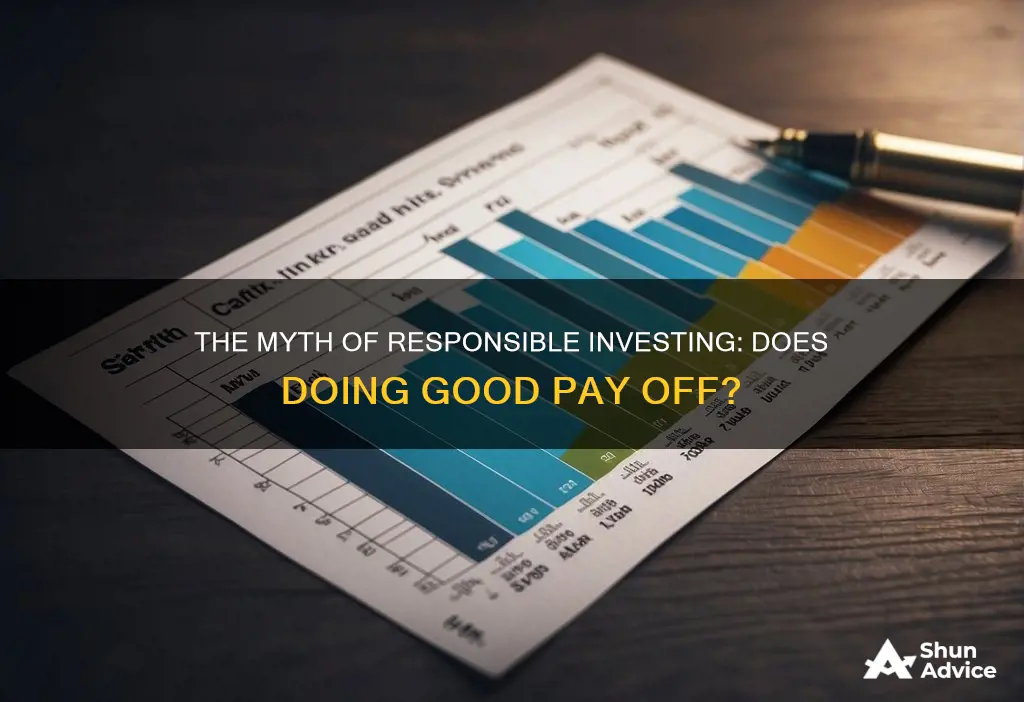
Socially responsible investing (SRI) is an investment strategy that aims to make a social impact and provide financial returns. SRI has grown in popularity in recent years, with more and more investors seeking to make a positive impact with their money. But does it pay off?
According to new data from JPMorgan Chase & Co, socially responsible investments in developing market debt perform roughly the same as traditional allocations. While they may not bring bigger returns, they certainly don't bring smaller ones either. This is supported by a 2023 analysis by Morgan Stanley, which found that sustainable funds outperformed traditional funds by 3.1% in the first half of the year.
So, while there may not be greater financial returns, socially responsible investing can still be considered a success, as it allows investors to support positive social and environmental change without sacrificing performance.
| Characteristics | Values |
|---|---|
| Returns | Socially responsible investments can perform as well as, or better than, traditional investments. |
| Risk | Socially responsible investments can be less volatile than traditional investments. |
| Popularity | Socially responsible investing is becoming more popular. |
| Cost | Socially responsible investments can be more or less expensive than traditional investments. |
| ESG Factors | Environmental, social and governance factors are important to socially responsible investors. |
| Non-financial Factors | Socially responsible investors consider factors such as climate change, air and water pollution, customer satisfaction, data protection, gender and diversity. |
What You'll Learn

Socially responsible investing (SRI) can be profitable
Socially responsible investing (SRI) is an investment strategy that aims to generate positive social change and financial returns. While it may be challenging for prospective investors to choose which businesses to back, SRI offers a way to invest in companies that meet or exceed personal expectations of ethical behaviour and positive social impact.
SRI has grown in popularity, with more investors seeking to align their money with their values. According to the Global Sustainable Investment Alliance, nearly $23 trillion, or 26% of all professionally managed assets globally, is now invested in "responsible investment strategies". This shift in investor behaviour has expanded the options available, with more funds and investment vehicles adopting SRI principles.
Performance of SRI
The performance of SRI has been a topic of debate, with some arguing that it may hinder returns by narrowing investment options. However, evidence suggests that SRI can be profitable and may even outperform traditional investment strategies.
A 2023 analysis by Morgan Stanley found that sustainable funds outperformed traditional funds by 3.1% in the first half of the year. Additionally, companies with superior environmental practices were found to exhibit lower risk, while less socially responsible companies were more likely to experience financial distress.
A separate study by the Morgan Stanley Institute for Sustainable Investing in 2021 showed that during the 2020 coronavirus pandemic, stocks, bonds, and mutual funds focused on environmental, social, and governance (ESG) factors performed better, with a median total return of 4.3% higher than non-ESG portfolios.
SRI and Risk
SRI investments tend to be less volatile and may offer lower risk. A 2020 research analysis from asset-management firm Arabesque Partners found that 80% of the reviewed studies demonstrated that sustainability practices positively influence investment performance.
Furthermore, companies with strong ESG practices often signal operational excellence, and there is research to suggest that these companies are more likely to outperform over the long term.
SRI allows investors to align their money with their values without sacrificing financial returns. While not all SRI funds will perform equally, and some due diligence is required to ensure companies are genuinely committed to their stated values, SRI can be a profitable strategy that benefits both investors and society.
Altcoin Investment: Best Picks
You may want to see also

SRI funds may be less volatile than traditional funds
Socially responsible investing (SRI) has been gaining popularity in recent years. SRI is an investment strategy that aims to generate both social change and financial returns for an investor. While SRI was once considered a fairly radical strategy, it has become more mainstream and lucrative.
There is evidence that SRI funds may be less volatile than traditional funds. Several studies have shown that SRI mutual funds can match, and sometimes outperform, traditional mutual funds. A 2020 research analysis from asset-management firm Arabesque Partners found that 80% of the reviewed studies demonstrated that sustainability practices have a positive influence on investment performance.
In the past, SRI funds were associated with higher fees than traditional funds. However, this is no longer the case, as there are now many inexpensive SRI funds available. For example, the Fidelity U.S. Sustainability Index Fund (FITLX) has an expense ratio of 0.11% and an above-average portfolio sustainability score of 50.
Creating an SRI portfolio is not difficult. Investors can choose to build their own portfolio or get help from robo-advisors, which use algorithms to build and maintain an investment portfolio based on an investor's risk tolerance and goals. Robo-advisors that offer SRI portfolios include Betterment, Wealthfront, and Merrill Edge Guided Investing.
When building an SRI portfolio, it is important to outline what is important to the investor. This may include considering whether gun manufacturers or companies that score low in environmental categories are deal-breakers. It is also crucial to research investments carefully, reviewing ratings from independent research firms and considering factors such as revenue, net income, sustainability reports, board diversity, and employee reviews.
In summary, SRI funds have become an increasingly popular and lucrative investment strategy. There is evidence that SRI funds may be less volatile than traditional funds, and they can provide investors with the opportunity to support social and environmental initiatives while building their portfolios.
Black Americans: Investors or Not?
You may want to see also

SRI is growing in popularity
Socially responsible investing (SRI) is an investment strategy that has been growing in popularity in recent years. SRI is an approach that considers not only the financial returns from an investment but also its impact on environmental, ethical, or social change. While it may have started as a niche activity associated with religious societies, it has evolved into a mainstream practice embraced by both individuals and corporations.
There are several reasons for the growing popularity of SRI. Firstly, investors are increasingly aware of the potential for financial gain alongside social impact. SRI funds can match or even outperform traditional mutual funds in terms of performance, and there is evidence that they may be less volatile. Secondly, the rise of social and environmental consciousness has influenced investment trends. For example, with growing concerns about global warming and climate change, investors are increasingly attracted to companies that positively impact the environment or invest in sustainable energy sources. Thirdly, the recent pandemic and other global events have increased the demand for ESG (environmental, social, and governance) investments. A 2020 survey by Investopedia and Treehugger found that nearly 60% of respondents indicated an increased interest in ESG investments, with 19% incorporating ESG standards into their portfolios.
The popularity of SRI is also evident in the increasing number of funds and investment vehicles available for retail investors. Mutual funds and ETFs provide exposure to multiple companies across sectors with a single investment, making it easier for investors to align their investments with their values. According to Morningstar, there were 303 sustainable open-ended mutual funds and exchange-traded funds in 2019, a significant increase from 111 in 2014. This growth in options reflects the increasing demand for SRI and makes it more accessible to a wider range of investors.
Another factor contributing to the popularity of SRI is the evolution of the investment trend itself. Initially, socially responsible investors avoided "sin industries" such as tobacco, liquor, and gambling. However, the strategy has evolved, and investors now seek out companies engaged in social justice, environmental sustainability, and alternative energy efforts. This evolution shows that SRI is dynamic and adaptable, allowing investors to address contemporary social and environmental issues through their investment choices.
Tips: Invest or Avoid?
You may want to see also

SRI funds may outperform traditional funds
There is a growing body of evidence that suggests socially responsible investing (SRI) funds can match or even outperform traditional funds.
A 2020 research analysis from asset-management firm Arabesque Partners found that 80% of the reviewed studies demonstrated that sustainability practices have a positive influence on investment performance. This is supported by a meta-analysis by the NYU Stern Center for Sustainable Business, which found that 59% of over 1,000 research papers published between 2015 and 2020 showed that sustainable options performed as well as or better than conventional approaches.
A comparison of the MSCI KLD 400 Social Index with the S&P 500 showed that the SRI index often performs as well as or better than the S&P 500. The difference in performance is often due to varying sector exposures. For example, SRI funds typically underexpose sectors like defence, banks, and energy, while overexposing technology. When the overexposed sectors outperform the market or the underexposed sectors underperform, SRI indexes tend to outperform traditional indexes.
A Morningstar analysis from 2022 showed that the Morningstar U.S. Sustainability Index outperformed its non-SRI parent by more than 0.6% and the S&P 500 by 0.7%. Similarly, most sustainable funds outperformed their Morningstar category indexes on a risk-adjusted return basis in 2021.
However, it is important to note that the performance of SRI funds depends on the specific values and criteria used to define SRI, which can vary from person to person.
Apple: A Wise Investment Right Now
You may want to see also

SRI is not limited to certain sectors
Socially responsible investing (SRI) is not limited to certain sectors. SRI is an investment strategy that focuses on generating social change and financial returns by investing in companies with positive social and environmental impacts. While SRI typically involves seeking out companies engaged in social justice, environmental sustainability, and alternative energy or clean technology efforts, it is not limited to specific industries or sectors.
SRI can be applied across various sectors and industries, depending on an investor's values and priorities. For example, investors passionate about the environment may choose to invest in green energy sources such as wind and solar companies. Those interested in supporting marginalized groups may invest in women-run companies or Black-owned businesses. Additionally, SRI can be achieved through investing in individual companies or through socially conscious mutual funds or exchange-traded funds (ETFs).
The flexibility of SRI allows investors to align their investments with their values across a diverse range of sectors. However, it is important for investors to carefully consider the potential for financial returns alongside social impact when making investment decisions.
SRI has gained popularity in recent years, with a growing number of funds and investment vehicles available for retail investors. This trend reflects a broader shift in investor priorities and an increasing demand for ESG (environmental, social, and governance) investing.
Investing in Commodities: Why?
You may want to see also
Frequently asked questions
Socially responsible investment (SRI) is an investment strategy that aims to make a social impact and provide financial returns. SRI investments can include companies making a positive sustainable or social impact and exclude those making a negative impact.
There are several ways to assess if an investment is socially responsible. One way is to research ESG (Environmental, Social, and Governance) ratings to see if a company meets high standards for corporate behaviour. Another way is to review independent research firms' ratings, such as Morningstar.
While there is no conclusive evidence, several studies suggest that SRI can yield superior risk-adjusted returns. A 2023 analysis by Morgan Stanley found that sustainable funds outperformed traditional funds by 3.1% in the first half of the year. Additionally, stocks of companies with superior environmental practices are less volatile than the broad market.







